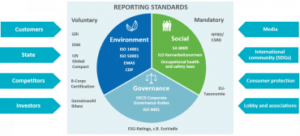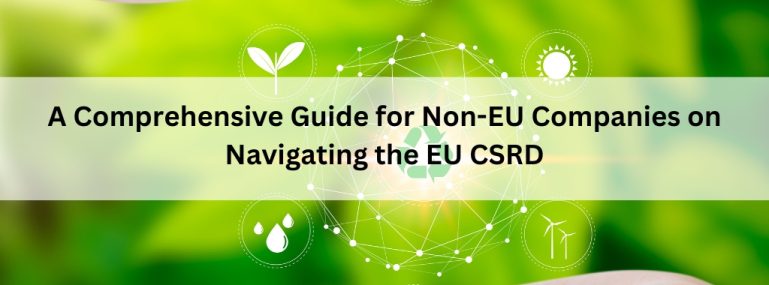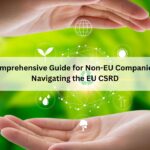In the realm of global business, environmental, social, and governance (ESG) considerations have gained unprecedented importance. The European Union (EU) has long been a pioneer in this area, and its latest initiative, the EU Corporate Sustainability Reporting Directive (CSRD), has significant implications not only for EU-based companies but also for non-EU companies operating within its jurisdiction.
Mandatory reporting is required across all three facets of sustainability management:
Environmental protection, including information on the six environmental objectives of the EU Taxonomy
Social responsibility, including treatment of employees, equal opportunities, and respect for human rights.
Governance, including anti-corruption and anti-bribery measures.

Challenges faced:
The EU Corporate Sustainability Reporting Directive introduces significant changes that can impact non-EU companies. The problem lies in navigating these changes effectively. Key challenges include determining whether your company falls under the directive’s scope, adapting to digital reporting requirements, and aligning with EU sustainability standards.
Solution :
Scope Assessment: To address the first challenge, non-EU companies should conduct a thorough assessment to determine whether they meet the CSRD’s reporting requirements. This involves considering the size of the company, its presence in the EU, and its impact on ESG factors. Seek legal counsel or engage with regulatory authorities for guidance.
Digital Reporting Readiness: Given the CSRD’s emphasis on digital reporting, non-EU companies should prepare by familiarizing themselves with the European Single Electronic Format (ESEF) and making necessary adjustments to reporting processes and infrastructure.
Harmonization with EU Standards: To meet the CSRD requirements, consider aligning your reporting with internationally recognized standards such as the Global Reporting Initiative (GRI) and the Task Force on Climate-related Financial Disclosures (TCFD), which are already in line with the EU’s ESG expectations.
Outcome :
The CSRD signifies a significant shift towards greater transparency and accountability in sustainability reporting. Non-EU companies that adapt to these changes can:
Strengthen their relationships with EU-based stakeholders.
Showcase their commitment to sustainability and ESG principles.
Facilitate access to the EU market, investors, and funding opportunities.
Improve their global competitiveness as ESG considerations become more integral to business decision-making.
The EU Corporate Sustainability Reporting Directive is a pivotal development in the world of sustainability reporting. Non-EU companies should recognize its extraterritorial reach and take steps to comply with its requirements. By doing so, they can not only adhere to regulations but also reap the benefits of a more sustainable and transparent business model, reinforcing their global presence and reputation.
Contact Us for Expert Insights on Compliance Solutions and ESG Practices
FAQ’s
1.Is the CSRD applicable to non-EU companies?
Yes, non-EU companies with a significant presence or impact in the EU may be subject to CSRD requirements.
2.What are the penalties for non-compliance with the CSRD?
Non-compliance may result in fines and reputational damage.
3.What topics do companies need to report on under the CSRD?
The CSRD covers a wide range of sustainability topics, including environmental, social, and governance issues.
4.What is ESEF?
It is the electronic reporting format in which issuers whose securities are admitted to trading on EU regulated markets must prepare their annual financial reports to facilitate accessibility, analysis and comparability of annual financial reports.






